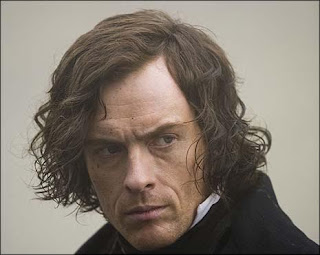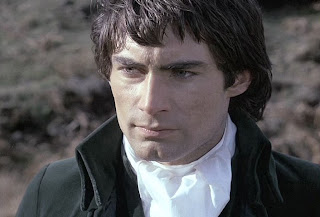 I came up with the Driving Plot Force of my next book, Road To Desire, and spilled the details to my friend and fellow Regency author, Myretta Robens. Myretta (who is also a celebrity blogger for PBS when they show Pride And Prejudice!) frequently has to listen as I discuss my plot, or what passes for my plot, when I am figuring out a book.
I came up with the Driving Plot Force of my next book, Road To Desire, and spilled the details to my friend and fellow Regency author, Myretta Robens. Myretta (who is also a celebrity blogger for PBS when they show Pride And Prejudice!) frequently has to listen as I discuss my plot, or what passes for my plot, when I am figuring out a book.
“Your heroes certainly have a death wish, don’t they?” she commented. And it’s true: My last hero, Alasdair, wanted to take drugs until he expired; this hero knows he will die as a result of An Action he is Determined to Take. In fact, all the heroes I am considering have a dark edge that may or may not result in their death.
Why? I do wear black most of the time, but I’m not a nihilist. I write romance, for goodness’ sake! I think it’s because I believe in the inexorable saving grace of love–a force so strong it can bring people back from any brink. And what brink is brinkier than death?!?
In pondering the heroes that made me swoon the most, a lot of them had death wishes, or faux death wishes: Heathcliff from Wuthering Heights, Mr. Rochester from Jane Eyre, most (all?) of Anne Stuart‘s heroes, and I am sure there are others. What makes that kind of single-minded, determined hero so darn attractive to me? Not sure, but I am set on a course for Death Wish heroes for a long time to come (except for the erotic novella I have in my head; the only death is the “little death” he is planning for the heroine. Heh, heh).
Do you find Death Wish heroes attractive? Who are your favorites?

I guess I don’t particularly find them attractive, Megan. I’m fine with heroes who go around doing heroic things without really worrying if they die, though…
Maybe I’m not really into the darker types… Though I like Rochester! 🙂
Cara
I go either way. There are times I like a nice brooding death wish hero, and then there are times I like a nice, witty, hero like the ones in Eloisa Jame’s Duchess series, or Henry Tilney in Northanger Abbey. I need balance of the dark and the light, otherwise I get depressed. For example, Heathcliff carrying Cathy to the window to die great! Heathcliff in the rest of the book, too depressing.
I like misunderstood heros, the kind who find a soulmate in the heroine. However, I don’t think I like them to be too serious or brooding. Like Elizabeth, sometimes I find it too overwhelming and depressing.
I love a Dark Hero, a man with a past, with injuries and regrets, but I like him to also have a sense of humor. So too dark and brooding probably doesn’t work for me.
Now a man who is willing to face death for something he believes in, who isn’t afraid of death, to whom things like honor are more important than death…Sigh. Those guys are my kind of guys.
Ah, Severus Snape, the ultimate Death Wish hero. He got his wish, too. Le sigh.
I also like heroes who are light with humor and irony, but they’re grounded in their lightness because they walked through the darkness. The sharp-edged boundaries of existence have been explored, mapped and wisdom gained.
Race de Vere in Jo Beverley’s Hazard is an excellent example of what I’m talking about. He looks like an angel, has seen the hell of war, and yet has wit to match his wisdom.
I do love Rochester and I love a hero who is willing to die for those he loves, but I am not so sure about the ones that deliberately court death. Still, Severus Snape was a seriously romantic hero once you got through all of the twists and turns in his personality. I think even a dark death wish hero can have a sense of humor – probably a bit cavalier and self deprecating – and that can be very amusing in a sad sort or way. As long as the hero is multi-faceted and layered and has that something that draws me to him, I like him.
These comments are comforting to me. I was worried that Cara might require me to take up some extremely dangerous hobby. And black always makes me look washed out.
Todd-who-prefers-a-nice-khaki
I definitely think we need to get Bertie the Beau to guest blog about this someday.
I do hear he is glued to the TV set watching taped versions of Masterpiece (Theatre), obsessing over every detail of the costumes, so maybe we will have to wait.
This sort of hero can be amazing but is hard to write. The setup has to be just right. I need to believe that he’s in some intolerable position that truly seems impossible to escape. Otherwise I don’t see why he doesn’t pull himself together and get out of it.
I’ve got a few tortured heroes in my idea file. I’ve also got one who has every excuse to act tortured but insists on joking and flirting instead. I think he’s quite hot, actually. 🙂
As one who’s never quite recovered from the death of Sidney Carton, I think it goes way beyond “broody.” Or should.
According to a wonderful book I’ve just finished: THE DANGEROUS LOVER: GOTHIC VILLAINS, BYRONISM, AND THE NINETEENTH-CENTURY SEDUCTION NARRATIVE, by Deborah Lutz, it’s about a kind of obsessive sensibility, very nineteenth century romantic, that is constitutionally unsatisfied and wandering. I find it exhilarating rather than “depressing.” According to Lutz it’s about a heroine finding the home ground of her self in the encounter with that unsatisfied, unsatisfiable other.
In my own writing, the closest I’ve come to pulling this off is with my sweet pussy-cat neurotic aristocrat Joseph in THE BOOKSELLER’S DAUGHTER, who ends the book never being entirely French or American, while petit-bourgeois Marie-Laure takes to immigration like a duck to water, and ends the book “at the center of the world.”
*According to Lutz it’s about a heroine finding the home ground of her self in the encounter with that unsatisfied, unsatisfiable other.*
Is this why we don’t see many Death Wish Heroines? We’re still doing Beauty and the Beast. Or they end up silly and self-obsessed like Lady Minerva Munday in “Getting it Right.”
Hmmm, what a delightful challenge. I’d love to have a sweet hero find his “home ground” in a *truly* dangerous to know heroine.